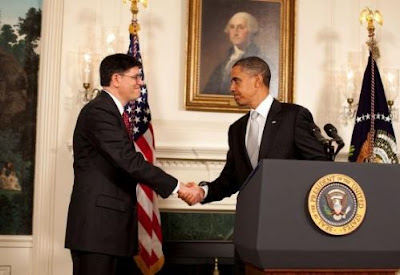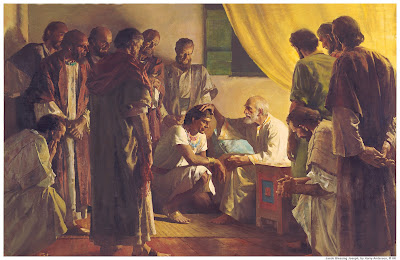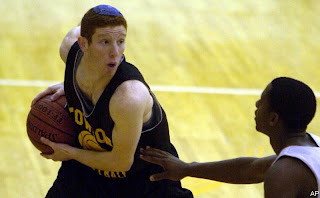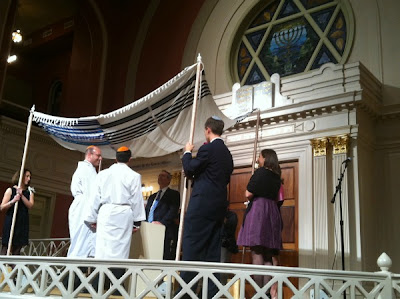The Omaha World-Herald reported today that Rabbi Jonathan Gross of the Orthodox Beth Israel Synagogue in West Omaha chose Warren Buffett to be the non-Jewish buyer of the congregant’s chametz (leavened food products that are forbidden on Passover). Buffett, at 81-years-old, is the third-richest man in the world with a $44 billion net worth according to the recent Forbes list of billionaires.
 |
| Warren Buffett accepts the four 50-cent pieces from Rabbi Jon Gross during the chametz sale. |
While Jews are required to rid their homes, offices and automobiles of all chametz products, there is a “legal fiction” that allows Jews to “sell” leavened goods that can’t be thrown away to a non-Jew who then sells the goods back following the holiday. A rabbi usually serves as the agent who transacts the deal on behalf of the congregation or community.
Before transacting the chametz deal with Buffett, Rabbi Gross explained the custom to the famous investor and head of Berkshire Hathaway Holdings. According to the Omaha World-Herald, Gross said, “Price is low before Passover. Price is high afterward. It’s a great short-term investment. So who would really appreciate this better than Warren Buffett?”
“The beauty of being an agnostic is that you are in no position to make any judgment about anything,” Buffett said in an interview. “You can join in on anything.”
Buffett said he decided to participate because the annual pre-Passover chametz sale is “a ceremony of enormous importance to Jews.” The only problem with Rabbi Gross’ planned arrangement with Buffett was that Passover begins this year at sunset on April 6 and due to his busy schedule, Buffett wanted to meet in late February (six weeks before Passover). Gross decided to keep the meeting with Buffett, because he wanted to raise awareness about the need for donations to the Food Bank for the Heartland.
To complete the ceremonial chametz sale Rabbi Gross gave Warren Buffett four 50-cent pieces along with a bottle of single-malt Scotch, a loaf of home-baked challah bread, and Buffett’s favorite snack, a bag of Cheetos (which incidentally aren’t kosher, but Gross wrote on his blog: “Cheetos are not kosher, but there is no problem buying a bag of them for someone who is not Jewish.”). Gross also handed Buffett two sets of keys — one to Beth Israel Synagogue and one to Gross’ west Omaha home, where the box and drums of food are kept. (Buffett agreed to donate the food to the food bank.)
The Oracle of Omaha and the west Omaha rabbi shook hands to complete the deal and Buffett even returned the 50-cent coins to the rabbi. He joked that now that he knows the asking price — four coins — he’ll bargain down to two coins next year. “Why didn’t anyone tell me about this earlier? This is a great investment,” Buffett said. “I could have been doing this for years.”
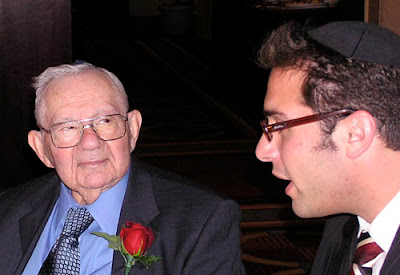 |
| Rabbi Myer Kripke with Rabbi Jonathan Gross in Omaha, Nebraska |
Gross, an Orthodox rabbi, also included Rabbi Myer Kripke in the purchase agreement with Buffett and brought the 98-year-old rabbi along with him to Buffett’s office. Rabbi Kripke is a retired Conservative rabbi who has been friends with Buffett for over 50 years, since the time they were were neighbors in Dundee. Rabbi Kripke’s late wife, Dorothy, wrote a children’s book series entitled “Let’s Talk About…” and Warren Buffett’s wife loved to read those books to her children. When she learned the author lived close by in Dundee she wanted to meet her. That is how the Kripkes and Buffets became dear friends. In the 1960s Buffett had the Kripke’s invest a small inheritance they had received from a relative in Berkshire Hathaway and from that investment they became millionaires many times over. That fortune allowed Myer and Dorothy Kripke to donate $10 million to the Jewish Theological Seminary to rebuild the tower under which the couple had been married decades earlier. That tower, which originally housed the Seminary’s library was severely damaged in a fire in 1966. Today it is known as the Kripke Tower.
On a personal note, Rabbi Kripke was very helpful in connecting me with Warren Buffett in 2009 when my uncle was diagnosed with Pancreatic cancer and given only a few months to live. I called Rabbi Kripke and told him how wonderful it would be if my uncle could play a round of golf at Augusta National where Mr. Buffett is a member. Within ten minutes I received a call from Mr. Buffett’s secretary Debbie Bosanek, who told me that she just asked Mr. Buffett (who was on a trans-Atlantic flight at the time) and he explained that Augusta National members were no longer allowed to grant such requests. Well, at least I tried and I’ll always be grateful to Rabbi Kripke for his assistance.
Back to Rabbi Gross and his chametz sale to Warren Buffett. I think this was an absolutely brilliant idea that Rabbi Gross had because it will make the sale of chametz more widely known. Perhaps because of Warren Buffett’s connection with this story, more Jews will make the effort to rid their homes of chametz before the Passover holiday and ensure that they include their name in their synagogue’s chametz sale.

